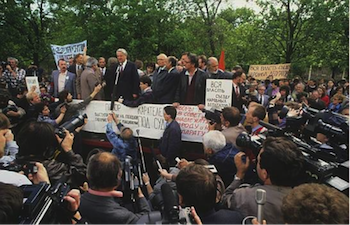

|
The Party Splits  Yeltsin rally for the Congress of People's Deputies, 1989 Challenged by the democratic forces of society, the one-party state began to crumble from the inside as radical reformers within the system made their sympathies for the opposition known. Alexander Yakovlev, the intellectual architect of Gorbachev's reforms, began to sound less like a Communist than a social democrat. Boris Yeltsin, the populist Moscow Party boss, openly attacked the conservative 'hardliners' (led by Yegor Ligachev). Resigning from the Politburo, he called for the de-Leninization of the political system and rallied popular support against the Party leadership. The Party was returning to the old divisions of 1917. Communist hardliners were alarmed by the speed with which the system seemed to be unravelling. Political reform was threatening to become a revolution undermining everything the Party had achieved since 1917. Their ideological opposition to perestroika and glasnost was articulated by Nina Andreeva, a chemistry lecturer in Leningrad, in an article entitled 'I Cannot Give up Principles', published in the newspaper Sovetskaya Rossiia on 13 March 1988. Edited by Ligachev and approved by several Politburo members, the article attacked the blackening of Soviet history, defended Stalin's achievements 'in building and defending socialism', and called on the Party to fight for its Leninist principles. Gorbachev resolved to push ahead with more radical reforms. At the 19th Party Conference in June 1988 he forced through the principle of contested elections for two-thirds of the seats in a new legislative body, the Congress of People's Deputies. This was not yet a multi-party democracy (87 per cent of the congress deputies were Communists). But the democratic principle could be used against the Party in regions where the population was united in its sentiment: 39 first Party secretaries suffered the humiliation of defeat in the Congress elections in early 1989. The Congress became a democratic platform against the one-Party state. The opening sessions at the end of May were watched by an estimated 100 million people on TV. Communist reformists and non-Party democrats demanded the removal of the Party's monopoly on power guaranteed by Article 6 of the Soviet Constitution. Gorbachev steered the reform through the Congress in March 1990. Having started his reforms to save the Communist system, he was now dismantling it. His views had been evolving as he came to understand the failures of the system and saw the limitations of its possible reform. From a Leninist position he moved to that of a social democrat. |
© 2014 Orlando Figes | All Rights Reserved